Protein-coding gene in the species Homo sapiens
Metallothionein 1X , also known as MT1X , is a protein which in humans is encoded by the gene .[ 3] [ 4] [ 5]
See also
References
^ a b c GRCh38: Ensembl release 89: ENSG00000187193 – Ensembl , May 2017^ "Human PubMed Reference:" . National Center for Biotechnology Information, U.S. National Library of Medicine .^ "Entrez Gene: MT1X metallothionein 1X" .^ West AK, Stallings R, Hildebrand CE, Chiu R, Karin M, Richards RI (November 1990). "Human metallothionein genes: structure of the functional locus at 16q13" . Genomics . 8 (3): 513–8. doi :10.1016/0888-7543(90)90038-V . PMID 2286373 . ^ Stennard FA, Holloway AF, Hamilton J, West AK (August 1994). "Characterisation of six additional human metallothionein genes". Biochim. Biophys. Acta . 1218 (3): 357–65. doi :10.1016/0167-4781(94)90189-9 . PMID 8049263 .
Further reading
West AK, Stallings R, Hildebrand CE, et al. (1991). "Human metallothionein genes: structure of the functional locus at 16q13" . Genomics . 8 (3): 513–8. doi :10.1016/0888-7543(90)90038-V . PMID 2286373 . Stennard FA, Holloway AF, Hamilton J, West AK (1994). "Characterisation of six additional human metallothionein genes". Biochim. Biophys. Acta . 1218 (3): 357–65. doi :10.1016/0167-4781(94)90189-9 . PMID 8049263 . Pauwels M, van Weyenbergh J, Soumillion A, et al. (1994). "Induction by zinc of specific metallothionein isoforms in human monocytes" . Eur. J. Biochem . 220 (1): 105–10. doi :10.1111/j.1432-1033.1994.tb18603.x PMID 8119276 . Mididoddi S, McGuirt JP, Sens MA, et al. (1996). "Isoform-specific expression of metallothionein mRNA in the developing and adult human kidney". Toxicol. Lett . 85 (1): 17–27. doi :10.1016/0378-4274(96)03632-6 . PMID 8619255 . Holloway AF, Stennard FA, West AK (1997). "Human metallothionein gene MT1L mRNA is present in several human tissues but is unlikely to produce a metallothionein protein" . FEBS Lett . 404 (1): 41–4. doi :10.1016/S0014-5793(97)00082-3 PMID 9074634 . S2CID 46527743 . Garrett SH, Somji S, Todd JH, et al. (1999). "Differential expression of human metallothionein isoform I mRNA in human proximal tubule cells exposed to metals" . Environ. Health Perspect . 106 (12): 825–32. doi :10.2307/3434126 . JSTOR 3434126 . PMC 1533231 PMID 9831543 . Hellemans G, Soumillion A, Proost P, et al. (2000). "Metallothioneins in human kidneys and associated tumors". Nephron . 83 (4): 331–40. doi :10.1159/000045425 . PMID 10575295 . S2CID 26103380 . Garrett SH, Sens MA, Shukla D, et al. (2000). "Metallothionein isoform 1 and 2 gene expression in the human prostate: downregulation of MT-1X in advanced prostate cancer". Prostate . 43 (2): 125–35. doi :10.1002/(SICI)1097-0045(20000501)43:2<125::AID-PROS7>3.0.CO;2-S . PMID 10754528 . S2CID 8768274 . Vandeghinste N, Proost P, De Ley M (2000). "Metallothionein isoform gene expression in zinc-treated human peripheral blood lymphocytes". Cell. Mol. Biol. (Noisy-le-grand) . 46 (2): 419–33. PMID 10774930 . Hartley JL, Temple GF, Brasch MA (2001). "DNA cloning using in vitro site-specific recombination" . Genome Res . 10 (11): 1788–95. doi :10.1101/gr.143000 . PMC 310948 PMID 11076863 . Rahman MT, De Ley M (2001). "Metallothionein isogene transcription in red blood cell precursors from human cord blood" . Eur. J. Biochem . 268 (3): 849–56. doi :10.1046/j.1432-1327.2001.01947.x PMID 11168427 . Garrett SH, Belcastro M, Sens MA, et al. (2001). "Acute exposure to arsenite induces metallothionein isoform-specific gene expression in human proximal tubule cells". J. Toxicol. Environ. Health A . 64 (4): 343–55. Bibcode :2001JTEHA..64..343G . doi :10.1080/152873901316981321 . PMID 11693492 . S2CID 43143430 . Strausberg RL, Feingold EA, Grouse LH, et al. (2003). "Generation and initial analysis of more than 15,000 full-length human and mouse cDNA sequences" . Proc. Natl. Acad. Sci. U.S.A . 99 (26): 16899–903. Bibcode :2002PNAS...9916899M . doi :10.1073/pnas.242603899 PMC 139241 PMID 12477932 . Izmailova E, Bertley FM, Huang Q, et al. (2003). "HIV-1 Tat reprograms immature dendritic cells to express chemoattractants for activated T cells and macrophages". Nat. Med . 9 (2): 191–7. doi :10.1038/nm822 . PMID 12539042 . S2CID 26145639 . Anderson NL, Polanski M, Pieper R, et al. (2004). "The human plasma proteome: a nonredundant list developed by combination of four separate sources" . Mol. Cell. Proteomics . 3 (4): 311–26. doi :10.1074/mcp.M300127-MCP200 PMID 14718574 . Gerhard DS, Wagner L, Feingold EA, et al. (2004). "The status, quality, and expansion of the NIH full-length cDNA project: the Mammalian Gene Collection (MGC)" . Genome Res . 14 (10B): 2121–7. doi :10.1101/gr.2596504 . PMC 528928 PMID 15489334 . Wiemann S, Arlt D, Huber W, et al. (2004). "From ORFeome to biology: a functional genomics pipeline" . Genome Res . 14 (10B): 2136–44. doi :10.1101/gr.2576704 . PMC 528930 PMID 15489336 . Mehrle A, Rosenfelder H, Schupp I, et al. (2006). "The LIFEdb database in 2006" . Nucleic Acids Res . 34 (Database issue): D415–8. doi :10.1093/nar/gkj139 . PMC 1347501 PMID 16381901 .
PDB gallery
1mhu : THE THREE-DIMENSIONAL STRUCTURE OF HUMAN [113CD7] METALLOTHIONEIN-2 IN SOLUTION DETERMINED BY NUCLEAR MAGNETIC RESONANCE SPECTROSCOPY
1mrb : THREE-DIMENSIONAL STRUCTURE OF RABBIT LIVER CD7 METALLOTHIONEIN-2A IN AQUEOUS SOLUTION DETERMINED BY NUCLEAR MAGNETIC RESONANCE
1mrt : CONFORMATION OF CD-7 METALLOTHIONEIN-2 FROM RAT LIVER IN AQUEOUS SOLUTION DETERMINED BY NUCLEAR MAGNETIC RESONANCE SPECTROSCOPY





















![1mhu: THE THREE-DIMENSIONAL STRUCTURE OF HUMAN [113CD7] METALLOTHIONEIN-2 IN SOLUTION DETERMINED BY NUCLEAR MAGNETIC RESONANCE SPECTROSCOPY](https://upload.wikimedia.org/wikipedia/commons/thumb/c/cb/PDB_1mhu_EBI.jpg/180px-PDB_1mhu_EBI.jpg)



